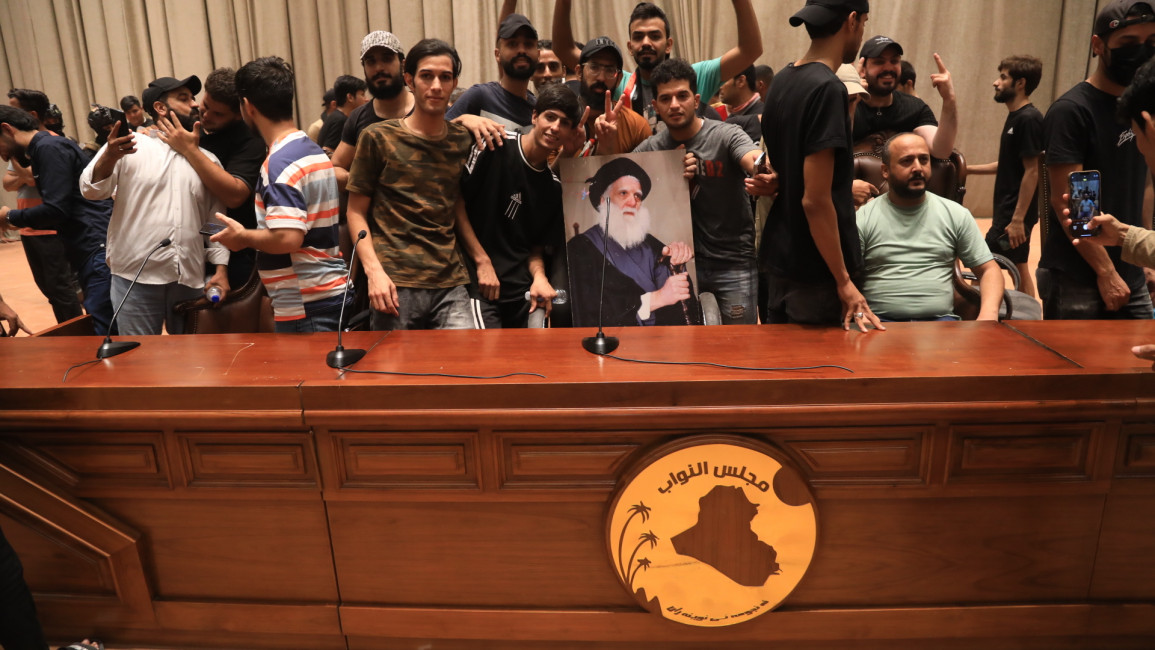Pro-Sadr protesters storm parliament in Iraq's fortified Green Zone
Supporters of powerful Iraqi cleric Moqtada Sadr on Wednesday danced and sang after storming parliament in the capital's high-security Green Zone, in protest at a rival bloc's nomination for Prime Minister.
Prime Minister Mustafa al-Kadhemi called on the protesters to "immediately withdraw" from the heavily fortified Green Zone, which is home to both government buildings and diplomatic missions.
BREAKING: Protestors in Baghdad have stormed into #Iraq’s Parliament inside the Green Zone in biggest demonstration since 2020. Mostly followers of Shia cleric Muqtada Sadr: pic.twitter.com/RBlm9xpGFS
— Joyce Karam (@Joyce_Karam) July 27, 2022
The protests are the latest challenge for oil-rich Iraq, which remains mired in a political and socioeconomic crisis despite elevated global energy prices.
Sadr's bloc emerged from elections in October as the biggest parliamentary faction, but was still far short of a majority and, nine months on, deadlock persists over the establishment of a new government.
Police fired barrages of tear gas in a bid to stop the protesters.
But state news agency INA said that protesters had "entered the parliament building", while Iraqi television showed crowds wandering around the building, waving national flags and cheering.
Kadhemi warned in a statement that security forces would ensure "the protection of state institutions and foreign missions, and prevent any harm to security and order".
Supporters of Moqtada al-Sadr stormed Iraq's parliament tonight. Proximate cause of their protest was decision of Sadr's political foes to anoint a PM candidate they saw as too close to Maliki. More broadly, this episode signals Sadr can/will use the street to derail politics.
— Louisa Loveluck (@leloveluck) July 27, 2022
"The protesters passed through the tough obstacles very easily and reached the Iraqi council of representatives and raised Iraqi flags inside the building," Aso Faraidun Amin, a Kurdish lawmaker from the Patriotic Union of Kurdistan (PUK) told The New Arab's correspondent in Iraq.
"They cheered Muqtada Sadr’s name many times, and the message behind the protests is that they do not want the Coordination Framework to form a new government."
"Muqtada al-Sadr is concerned that if al-Maliki and his alliance succeeded in forming this government, his position and security might be in danger, thus Sadr wants the current Iraqi caretaker government of Mustafa Al-Kadhimi to remain in power, and pave the way for holding an early election after the Iraqi parliament would be dissolved," he added.
Pro-Sadr officials went to persuade protesters to leave, an interior ministry official said.
An AFP correspondent in the Green Zone had earlier seen protesters carrying a fellow demonstrator who had been hurt.
Sadr's bloc won 73 seats in last year's election, making it the largest faction in the 329-seat parliament. But since the vote, talks to form a new government have stalled.
The protesters oppose the candidacy of Mohammed al-Sudani, a former minister and ex-provincial governor, who is the pro-Iran Coordination Framework's pick for premier.
The Coordination Framework draws lawmakers from former premier Nuri al-Maliki's party and the pro-Iran Fatah Alliance, the political arm of the Shiite-led former paramilitary group Hashed al-Shaabi.
"I am against the corrupt officials who are in power," said protester Mohamed Ali, a 41-year-old day labourer. "I am against Sudani's candidacy, because he is corrupt."
Iraq was plunged deeper into political crisis last month when Sadr's bloc quit en masse.
Sadr had initially supported the idea of a "majority government" which would have sent his Shiite adversaries from the Coordination Framework into opposition.
The former militia leader then surprised many by compelling his lawmakers to resign, a move seen as seeking to pressure his rivals to fast-track the establishment of a government.
Sixty-four new lawmakers were sworn in later in June, making the pro-Iran bloc the largest in parliament.
Earlier this month, hundreds of thousands of Muslim worshippers loyal to Sadr attended a Friday prayer service in Baghdad, in a display of political might.
The huge turnout came despite scorching heat and the Shiite cleric not being there in person -- an indication of his status as a political heavyweight, as well as a key religious authority.
The mercurial cleric's sermon took aim at rivals from other Shiite factions.
"We are at a difficult... crossroads in the formation of the government, entrusted to some we do not trust," Sadr said in the speech on July 15, read out by Sheikh Mahmud al-Jayashi.
Some factions have shown they are "not up to the task", he added.
Sadr's sermon took particular aim at the Hashed al-Shaabi, which has been integrated into the army, but is seen by many Iraqis as an Iranian proxy.
Hashed supporters last year protested near the Green Zone, demonstrating against what they said was vote "fraud".



